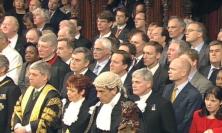The contenders for the leadership of the Labour Party have now been decided, but the nominations process was plagued by media interference. This, Joe Egerton argues, exemplifies what Pope Francis means by the terrorism of gossip and is as harmful to the body politic as the Tudor terror that claimed the lives of John Fisher and Thomas More.
On 21 March this year, Pope Francis put aside his ‘boring’ prepared address to a gathering of religious and chose to speak instead about some of the vices that he considered to be a threat to Religious Life. A particular target was ‘the terrorism of the gossip. Who gossips is a terrorist that throws a bomb and destroys. Gossip destroys’.[1]
Pope Francis on gossip
This was no unprecedented outburst. Pope Francis has repeatedly denounced the evil of gossip. In a 2013 homily, he described those who gossip as being ‘persecutors and violent.’[2] That homily started from the words in the Sermon on the Mount that will be read at Masses on 22 June this year, which is the feast of Saints John Fisher and Thomas More: ‘Why do you inspect the splinter in your brother or sister’s eye, but fail to notice the plank that is in your own eye? Or how come you tell your brother or sister “Just let me get rid of the splinter from your eye”, and look! There’s a plank in your eye.’ Pope Francis drew attention to the strong language that Jesus employs:
Those who live judging their neighbour, speaking ill of their neighbour, are hypocrites, because they lack the strength and the courage to look to their own shortcomings. The Lord does not waste many words on this concept. Further on he says that he who has hatred in his heart for his brother is a murderer.
In a February 2014 homily, the pope repeated the message:
Jesus reminds us that even words can kill. When it is said that someone has the ‘tongue of a serpent,’ what does it mean? That his words kill. Therefore, not only must one not make an attempt on the life of others, but one must not even pour on him the poison of anger and hit him with slander, nor speak ill of him. And here we arrive at gossip. Gossip can also kill, because it kills the reputation of the person. [3]
Thomas Aquinas on gossip
The pope’s words are indeed powerful, and they lay down a strong challenge not only to followers of Christ but to all men and women, as Thomas Aquinas makes clear.
The Summa Theologiae unequivocally condemns the repeating of gossip, be that gossip true or false.[4] Aquinas is writing as a philosopher, as well as a theologian. He is of course a Christian philosopher, but his purpose is to demonstrate that gossip is to be condemned because, independent of revelation, our reason tells us so. To anyone who would claim that the pope’s sermon applies just to Christians, or even Catholics, Aquinas has a definitive response: gossip is an offence against the cardinal virtue of justice, therefore all men and women of good will should avoid gossip, because it hinders us in attaining our good and harms our civil society.
The terrorism of gossip in the media
Since the General Election, this societal harm has been demonstrated in the media-inspired terror that has gripped UK politics, particularly in the form of intrusion into politicians’ lives. One prominent Labour MP, Mr Chuka Umunna, withdrew his candidacy for the leadership of the Labour Party following the door-stepping of his girlfriend’s family – including her 102-year-old grandmother. Another, Mr Dan Jarvis, said that he could not even stand for the leadership because of the effect that media intrusion would have on his young family. We have also been treated – if that is the right word – to details of the marital difficulties of Mr Speaker Bercow and his wife.
There are, of course, circumstances in which a journalist is fully entitled to investigate a lead – if it had been thought that a candidate for office was engaged in criminal activity or otherwise deceiving the public on an issue of policy, a journalist would be fully entitled to pursue enquiries and a paper to publish. But the matters being reported had no bearing whatsoever on the fitness of Mr Bercow to be Speaker or Mr Umunna to be Leader of the Opposition. Without doubt, the re-gurgitation of details of the Bercows’ marriage – even if in the form of a report of what Mrs Bercow had said – is gossip. Nor could anything said by a family member of Mr Umunna’s girlfriend be classified as anything but gossip.
These particular cases exemplify the violence and persecution which Pope Francis has unequivocally condemned. If somebody had planted a bomb that killed or injured Mr Bercow or Mr Umunna or Mr Jarvis, we would immediately recognise it for what it was: terrorism. What would make it terrorism is the effect on the body politic. When media intrusion into the private lives of politicians’ families – a form of gossip – is either an act of revenge (perhaps for Mr Bercow’s role in enabling the House of Commons to intervene effectively in the phone-hacking scandal) or has the foreseeable effect of deterring an individual from standing for office, then the pope’s denunciation of gossip as terrorism has traction.
The label ‘terrorism’ is entirely applicable when, as in these cases, the effects are intentional.[5] It is not open to journalists, editors and proprietors to shirk responsibility for Mr Umunna’s standing down, for example, by saying, ‘we were simply delivering information that the public is entitled to know, the decision taken by Mr Umunna was his, not ours, ’ because that decision was a foreseeable consequence of their actions. Those involved have made themselves terrorists because they are culpable for the effects of the gossip they have propagated.
The harassment of Mr Umunna’s girlfriend’s family, and the climate of fear created by such behaviour that deterred Mr Jarvis from standing, has harmed every single citizen of the United Kingdom. While the choice of leader of the Labour Party is rightly made by supporters of the party, everybody has an interest in the good government of the country and that requires that the best available candidates should run for Leader of the Opposition. That right is at least diminished, if not denied, when the terrorism of gossip excludes candidates who decide that they cannot expose their families to media intrusion.
Similarly, improper interference in the election of the Speaker, or on decisions taken by the Speaker, is also a direct attack on us all. The Speaker has a crucial role in enabling the House of Commons to control the executive. We are fortunate to have a Speaker who is not easily bullied, but that does not mean that the longer term issues raised by what we have witnessed can safely be ignored.
Do we need new legislation?
It does not follow from the fact that something is a grave sin that it should be made unlawful. Aquinas argued that the test in human law is not whether an action is vicious or even harmful, but whether it is likely to jeopardise the ability of society to function; he cites theft or murder as examples of what should properly be punished[6]. In this case, there is a further issue: a free press is undoubtedly a good and limitations should only be imposed if necessary to prevent really serious harm. But what has happened since the election must cause us to consider whether new legal restraints on media intrusion would be justified.
It may well be that the existing law can prevent what we have witnessed and it simply needs to be enforced – a point repeatedly made over phone-hacking was that the culprits could be sanctioned effectively under existing laws. However, the harassment of a 102-year-old-lady, even if it has not broken any existing law or does not warrant legislation, puts the conduct of the media back on the agenda.
Envoi: a reflection on two English Saints
Thomas More and John Fisher died because they were not prepared to endorse the tyrannical actions of Henry VIII. When More resigned his office as Lord Chancellor, he sought to retire into private life; had he been allowed to do so, he might have been little more than a footnote in history, but he was pursued by the king. He died on the scaffold because he refused to give his approval to Henry’s renunciation of his coronation oath to respect the spiritual rights of God’s church and to a temporal ruler’s attempt to establish a religious tyranny over England. Fisher was rather more open in his opposition.
Mr Umunna and Mr Jarvis, faced with media terror, have essentially done what Thomas More attempted to do when faced with Henrician terror: they have chosen to relinquish their ambitions in order to escape the worst harassment. Unlike Henry VIII, journalists, editors and proprietors are content when they have hounded their prey from office and it is tempting to conclude from the fact that Mr Umunna’s and Mr Jarvis’ heads remain on their shoulders that there is no reason to bring the media to book.
That would be, I suggest, a serious error. The absolute power of a Tudor monarch – which would have been unaffected had he let John Fisher and Thomas More retire into quiet obscurity – allowed him to change the religion of England in defiance of his coronation oath and, in so doing, generated the hatreds that led to horrendous deaths in the second half of the 16th century and arguably to civil war in the next century. The arbitrary power of a media mogul in the 21st century is similarly indifferent to suffering (such as of MPs’ families) and equally poisonous to the body politic. Sooner or later heroic individuals may make a stand, perhaps because like Saints John Fisher and Thomas More they are forced into a corner and refuse to bow to Baal. But nobody should be put in that position. We should all be allowed constitutional government which is the best guarantee that we live our days in peace. This requires that political power is subject to constitutional restraints. There is a prima facie, although not necessarily conclusive, argument that the terrorism of gossip constitutes a form of unrestrained political power that should not just be condemned as wicked but constrained by law as harmful.
Now that the free selection of the Leader of the Opposition has been jeopardised, it is even more important that Mr Speaker Bercow continues to champion the rights of backbench MPs against those who wield power. Being in the nearer presence of God, his predecessor as Speaker, St Thomas More, is able to intercede for him, and so 22 June – the feast of Saints John Fisher and Thomas More and the anniversary of Mr Bercow’s election in 2009 – is an appropriate day for us to call for St Thomas’s aid in this war on the terror of gossip.
Joe Egerton was Conservative candidate for Leigh in 1992 and worked for successful Conservative candidates in 2010.
[1] http://ncronline.org/news/vatican/francis-decries-religious-who-let-money-influence-terrorism-gossip
[2] In a homily given at the Domus Sanctae Marthae on 13 September 2013: http://ignatiusloyola.org/news/pope-francis-friday-morning-homily-on-destructive-nature-of-gossip
[3] Pope Francis was preaching on a Gospel reading that starts at Matthew 5: 17, where Jesus states ‘Don’t think that I came to undermine the Torah or the Prophets. I haven’t come to undermine them but to fulfil them. For – Amen I tell you – not a single letter, not a single punctuation mark will pass from the Torah until it all happens.’ This section ends with: ‘Because I’m telling you, unless your righteousness surpasses that of the scribes and Pharisees, no way will you go into the kingdom of heaven’. Then, at verse 21, Jesus gives the example of the fifth commandment, ‘You have heard it said “you shall not kill,” (Exodus 20:13) and whoever kills will be liable to the Judgement. But I tell you, everyone who is angry with his brother or sister will be liable to the Judgement.’
[4] The discussion of gossip falls under a number of headings in the Summa. At ST IIaIIaeQ72 Aquinas discusses contumelia– ‘reviling’ – that is, uttering (publishing) words that dishonour another. At STIIaIIae Q73 Aquinas discusses detractio – ‘backbiting’ – which he states involves ‘secret words’. The publication of a story is not secret. At STIIaIIaeQ74 he discusses susurratio – ‘tale-bearing’ – which is distinguished from detractio by its purpose: susurratio is intended to end friendship while detractio is intended to dishonour.
[5] In his book on Catholic philosophy, God, Philosophy, Universities, Alasdair MacIntyre has summarised an argument advanced by the Oxford analytic philosopher Elizabeth Anscombe as follows: ‘To identify an action just is to identify the intention or intentions embodied in that action. So we can distinguish an action and those consequences which, by performing that action, the agent intended to bring about from those consequences that were incidentally, but not intentionally, brought about by that action. We do so by considering under what description or descriptions that agent intended that action. An agent who acts with deliberation does so, having in mind the intended consequences of his action, that is, he intends an action that will have just those consequences. If, for example, I intentionally and deliberately do something that involves taking the lives of innocent people, albeit with the further intention of achieving some good through this means, then what I do—the action constituted by and identified through the description informing my intention—is, whatever else it may be, murder. So in evaluating anyone’s action the descriptions of that action that are to be considered are all those under which the action was intended by the agent.’ (MacIntyre, Alasdair, God, Philosophy, Universities: A Selective History of the Catholic Philosophical Tradition (Rowman & Littlefield), pp. 161-2.






